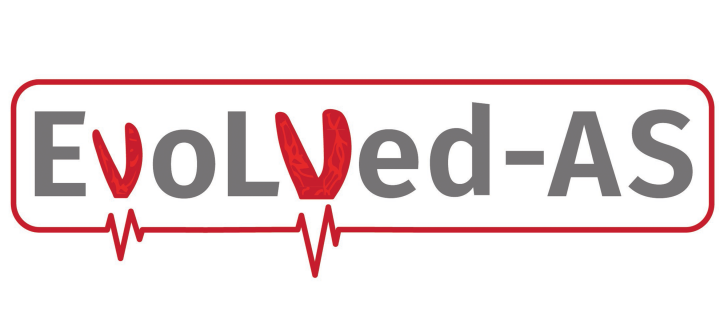EVOLVED Trial
Randomised controlled trial of early surgery in asymptomatic patients with severe aortic stenosis and objective evidence of left ventricular decompensation (myocardial fibrosis on magnetic resonance imaging) clinicaltrials.gov NCT03094143

The aortic valve can be thought of as a one-way door through which blood leaves the heart to enter the body. It has to be able to open well to allow blood out and close properly to stop blood leaking back and overloading the heart.
Aortic stenosis is a condition where the aortic valve becomes progressively narrowed (stenosed; i.e. the door doesn’t open very well) usually over a number of years or decades. This is usually caused by hardening and thickening of the valve so that it becomes less flexible. This puts a strain on the heart muscle as it has to work harder to “open the door” and pump blood through the narrowed valve. For many years the heart adapts and copes with this increased pressure but eventually it is no longer able to cope and patients develop symptoms (chest pain, breathlessness, collapse) and an increased risk of heart failure and dying. The only treatment currently available for severe aortic stenosis is surgery to replace the narrowed valve. The timing is key: replace the valve too early and patients are put through surgery and the risk of a replacement valve without reason; too late and patients may be left with irreversible symptoms and heart failure. At the moment we replace the valve when patients first develop symptoms but these can be tricky to assess in patients with lots of other health conditions or in those that are inactive. As a consequence the timing of aortic valve operations is often suboptimal.
Fibrosis or scarring of the heart is one of the key processes that causes the heart to fail in this condition. Scarring once formed does not appear reversible, so any scar that forms prior to valve replacement will remain with the patient even after surgery. Using cardiac MRI (a completely safe method of scanning the heart involving strong magnetic fields and lying in a tunnel) we are able to detect the earliest stages of this scarring. We believe this will identify patients whose hearts are starting to fail (even before they develop symptoms) and who therefore need prompt replacement of their valves.
In our study we will use cardiac MRI to look for heart scarring in patients with severe aortic stenosis but no symptoms. Patients with confirmed heart scarring will then be randomised to either early valve replacement surgery or to the current treatment strategy. This consists of continued monitoring of the valve over time waiting for patients to develop symptoms.
We believe that performing aortic valve replacement on patients with severe aortic stenosis with no symptoms but who have evidence of early scarring on cardiac MRI will prevent further scarring from forming, reduce subsequent heart failure and lead to improved long-term symptoms following surgery (e.g. breathlessness) and a reduced chance of dying. The aim of this trial is to find out whether this is correct.
Research Methods and Objectives
Patients with severe asymptomatic aortic stenosis from across 16 UK centres will initially be screened using a simple blood test (high sensitivity troponin I) and/or an ECG. Patients with healthy heart muscle on screening will not proceed further. 1000 patients with some evidence of myocardial injury will proceed to cardiac MRI to look for fibrosis. Patients with such fibrosis will be considered to have objective evidence of left ventricular decompensation. These patients will then be randomised to early valve replacement or standard therapy where surgery is usually delayed until symptoms develop. Patients will then be followed by for the primary end point or all cause mortality and/or unplanned aortic stenosis related hospital admission. This will inform whether early surgery in patients with myocardial scarring results in improved clinical outcomes.
Principal Investigator, Co-Investigators, Other researchers
Principal Investigator: Dr Marc Dweck.
Co-Investigators: Prof David Newby, Dr Tim Cartlidge, Dr Rong Bing, Dr Chris Tuck (trials manager)
We work with the Edinburgh Clinical Trials Unit and are supported by project grants and research fellowships from the British Heart Foundation. Further information is available through our Twitter feed @EVoLVeD_trial or you can email marc.dweck@ed.ac.uk.

